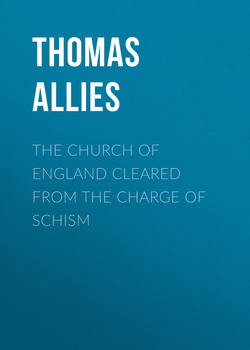Читать книгу The Church of England cleared from the charge of Schism - Allies Thomas William - Страница 1
ADVERTISEMENT
ОглавлениеThe writer of the following pages is more and more convinced that the whole question between the Roman Church and ourselves, as well as the Eastern Church, turns upon the Papal Supremacy, as at present claimed, being of divine right or not. If it be, then have we nothing else to do, on peril of salvation, but submit ourselves to the authority of Rome: and better it were to do so before we meet the attack, which is close at hand, of an enemy who bears equal hatred to ourselves and to Rome; the predicted Lawless One, the Logos, reason, or private judgment of apostate humanity rising up against the Divine Logos, incarnate in His Church. If it be not, then may we take courage; for the position of the Church of England being tenable, all the evils within her pale, which we are now so deeply feeling, will, by God's blessing, be gradually overcome. As to practical abuses in her, who will venture to say they are so great as in the Roman Church of the tenth century, when the First See was filled successively by the lovers of abandoned women, who made and deposed Popes at their will? Our cause being good, all that we have to deplore of actual evil should lead to more earnest intercession, more continued striving after that love which breathes itself forth in unity, but should not shake the confidence of any obedient heart in our mother's title. When the Donatists made the crimes of individuals an excuse for breaking unity, St. Augustin reminded them, that the crimes of the chaff do not prejudice the wheat, but that both must grow together till the Lord of the harvest send forth his angels to make the separation.
The writer will not conceal that he took up this inquiry for the purpose of satisfying his own mind. Had he found the Councils and Fathers of the first six centuries bearing witness to the Roman supremacy, as at present claimed, instead of against it, he should have felt bound to obey them. As a Priest of the Church Catholic in England, he desires to hold, and to the best of his ability will teach, all doctrine which the undivided Church always held. He finds by reference to those authorities which could not be deceived, and cannot be adulterated, that while they unanimously held the Roman primacy, and the patriarchal system, of which the Roman pontiff stood at the head, they as unanimously did not hold, nor even contemplate, that supremacy or monarchy which alone Rome will now accept as the price of her communion. They not only do not recognise it, but their words and their actions most manifestly contradict it. This is, in one word, his justification of his mother from the sin of Schism. If true, it is sufficient: if untrue, he knows of no other.
But should any opponent think these pages worthy of a reply, the writer warns him, at the outset, that he must in fairness discard that old disingenuous trick of using testimonies of the Fathers to the primacy of the Roman See in the episcopal and patriarchal system, in order to prove the full papal supremacy, as now claimed, in a system which is nearly come to pure monarchy. By this method, because the Fathers recognise the Bishop of Rome as successor of St. Peter, they are counted witnesses to that absolute power now claimed by the Roman pontiff, though they recognise other Bishops, in just the same sense, to be successors of the holy Apostles; or though they call every Bishop's see the see of Peter, as the great type and example of the episcopate. What such an one has to establish in order to justify the Roman Church, and to prove that the English and the Eastern are in Schism, is, that Roman doctrine, as stated by Bellarmine, which is really the key-stone of the whole system, that "Bishops succeed not properly to the Apostles," "for they have no part of the true apostolic authority," but that "all ordinary jurisdiction of Bishops descends immediately from the Pope," and that "the Pope has, full and entire, that power which Christ left on the earth for the good of the Church."1 Let this be proved on the testimony of the first six centuries, and if it be true, nothing can be more easy than to prove it, as the contradictory of it is attempted to be proved in the following pages, and all controversy will be at an end. We claim that it should be proved, for even De Maistre, who has put forward this theory with the least compromise, declares, "There is nothing new in the Church, and never will she believe save what she has always believed."2
1
Bellarmin. de Rom. Pont. Lib. iv. 25; iv. 24; i. 9.
2
De Maistre, du Pape. Liv. i. ch. i.
